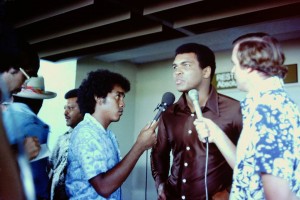Jordan and Ali is a matter of dollars and change

Honolulu sportscasters Paul Guanzon and Joe Moore interviewed Muhammad Ali at the Kona airport in 1976. Photo courtesy of Mike Hildenbrand.
In 1999 when ESPN counted down the top 50 athletes of the 20th century, Muhammad Ali was third to No. 2 Babe Ruth and No. 1 Michael Jordan. If we’re talking merely dominating a sport, Ali’s in the right spot. But if the panel had voted based on impact on the world in general, Ali would’ve or should’ve been No. 1 in a landslide. No athlete before or since transcended sports the way he did. I don’t like to use the word “important” when describing athletes. But he was.
From what I understand, the panel was told to vote based on just the sports impact. Out of their arenas, Jordan’s impact could be measured in dollars and Ali’s in change.
Dollars: Air Jordan sales and ad campaigns like “Be Like Mike” stimulated big business.
Change: Ali’s defiance and braggadocio served a social purpose in the ongoing battle for civil rights. The message wasn’t “Be Like Ali” as much as it was have the confidence to be yourself and stand up for your beliefs.
Jordan and Ali were cultural icons, but Ali’s relevance is much more enduring, unless perhaps you’re a Nike or Gatorade shareholder. Michael Jordan rarely if ever used his immense popularity as a platform to encourage social change; some folks like their athletes that way.
Today, athletes make draft decisions that have to do with choosing between millions of dollars or going to college. In the 1960s, for young American men — athletes or not — it was about going to college, being forced to fight a war you had no belief in, finding a way to dodge the draft, or representing the old-school form of patriotism and fighting for your country when called upon (or volunteering) because it’s your “duty as an American.”
For these rank-and-file Americans, the option of going to Canada wasn’t about honing skills in the CFL. The issues were life and death, right and wrong, and being perceived as a baby killer or a coward and traitor. The war in Vietnam may have torn apart more American families than the Civil War.
Ali’s draft decision was also life and death — not necessarily for himself, but for many other Americans. When he refused induction into the United States Army in 1967, Ali empowered many other young Americans — black, white, brown, yellow, green, whatever — to do the same, or to protest the war.
Whether this made him a patriot or a traitor (how would a charismatic young Muslim quoting the quran as a reason to not go to war play today to some in ‘Merica?) depends on perspective.
But when he said, “I ain’t got no quarrel with the Viet Cong,” millions in America and worldwide heard it, and it resonated. Ali helped turn the popular tide against the war and although it took years of social upheaval and violence on the streets and on the college campuses of America, it was part of why the war finally ended and I believe Ali’s stance saved lives in the long run.
Nice article Dave…
Another great, thoughtful and interesting piece written by my friend Dave Reardon.
Would Hank Aaron be in the top 5?
Icon. Transcended the sport. Fought thru the color barrier. Received death threats upon breaking Ruth’s all time home run record. Very respected. As a kid growing up during Aaron’s era he was one that left the greatest impression on me more so than Jordan.
Regarding Ali. He will be missed. Definitely cut from a different cloth.
Muhammad Ali in his prime would have been a sight to behold as a combatant against the hate rhetoric of Donald Trump. Instead of “Lockup”, MSNBC showed the documentary “When We Were Kings”. That punch which knocked out pre-grill George Foreman was more impressive than any one particular Michael Jordan moment.
Wow. Foreman must have consulted an image consultant when he made his second run at the heavyweight title.
Redemption for Byron Russell.
Jordan pushed him off.